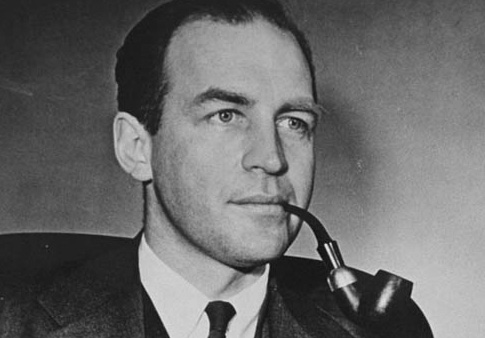
7/7/21
An Omahan saved countless Jews during the Holocaust, then faded into oblivion
An Omahan saved countless Jews during the Holocaust, then faded into oblivion
The Omaha boy didn’t seem like a savior.
John Pehle got a college degree from Creighton, scored a good but anonymous job inside the federal government, had a wife and two kids and a nice house in the Washington, D.C., suburbs. He sure never profiled as a revolutionary. He wore a dark suit, smoked an old man’s pipe, spoke fluent bureaucrat and regularly bowled with his work buddies in a weekly league. But he quietly did something else, too, something hidden and heartrending, something epic that 75 years later has somehow been forgotten.
In the waning days of World War II, John Pehle from Omaha helped save the lives of tens of thousands of Jewish men, women and children. Maybe hundreds of thousands. This largely unknown graduate of Central High saved far more Jews from Hitler than did Oskar Schindler. And yet, John Pehle is not in the Nebraska Hall of Fame. He’s not in the Central High School Hall of Fame. We don’t even know how to pronounce John Pehle’s name. It is “Paley” not “Peel.”
“I really feel like he’s a Ward Cleaver type who becomes a hero,” says Rebecca Erbelding, a historian at the U.S. Holocaust Museum whose book, “Rescue Board,” seeks to place Pehle’s efforts in the spotlight after decades in the shadows. “He didn’t seem that way. He didn’t even see himself that way. But he had it inside of him all along.”
Starting in 1944, Pehle and a small band of U.S. Treasury Department officials harnessed the power of the American government to aid some of the world’s most endangered people — Jewish refugees scattered across Nazi-occupied Europe, many of them one train ride away from the prison camps and the gas chambers. For the 20 months the War Refugee Board existed, Pehle and his allies also tried as best they could to right a horrific wrong.
For years prior, America’s most powerful politicians, including President Franklin Delano Roosevelt, had largely ignored the plight of European Jews as the Nazis first demonized them, then imprisoned them, then slaughtered them by the millions. The American public also tended to look the other way. Some anti-Semites in the U.S. believed the Jews deserved what they got — and anti-Semitism ran deep in the United States in the years preceding World War II. Others argued that the United States had bigger goals — first, staying out of the war, and then, after Pearl Harbor, fighting the war — and couldn’t focus on the plight of refugees half a world away. Still others simply could not fathom the horror of what eventually became known as the Holocaust. In 1943, even after the first comprehensive reports of the genocide had landed in magazines and newspapers, more than half of Americans polled simply did not believe that millions of Jews were perishing at the hands of Nazis.
That American inaction ended on Jan. 16, 1944, when Pehle and his boss, Treasury Secretary Henry Morgenthau Jr., walked to the White House to meet with Roosevelt. To give you some sense of Pehle’s place in the D.C. hierarchy: This was his first-ever White House meeting. And yet, he walked out with a tentative agreement from Roosevelt that the United States would create something called the “War Refugee Board.” John Pehle would run it.
In some ways, this made no sense. Pehle was a 34-year-old upright Protestant from Omaha, the son of Otto and Agnes Pehle. Otto moved the family to Omaha in the 1920s after he got an oil company job here. John graduated from Central, got his undergraduate degree from Creighton — in English — and then breezed his way through Yale Law School. He climbed his way through the Treasury Department, becoming a trusted assistant to the secretary. He was a serious man, a smart man, a quiet man, and a man who had spent zero time publicly focused on the plight of Jewish refugees. But in other ways, Pehle was perfect.
He was perfect because he deeply understood the inner workings of the American federal government. He understood whom to ignore, whom to appease and how to quickly move government money. And he was perfect because underneath Pehle’s starched exterior beat the heart of a humanitarian. He knew how to help the Jewish people and he would because it was simply the right thing to do.
Erbelding’s well-researched book lays out how he did it: Pehle authorized the quick payment of millions of dollars to religious and relief organizations already working to save Jews in Europe. He unlocked funds to evacuate Jews across the Spanish border. He authorized the delivery of false ID papers so that Hungarian Jews could claim they were Salvadoran. He got the State Department — which had fought actively against aiding Jewish refugees — to reissue American visas to any refugee who had already been granted one. He authorized payments to buy a ship meant to transport Jews to Palestine. He authorized payments to move thousands of refugees out of Europe, through Turkey and toward safety. He built support for a refugee camp in the United States — then, as now, many Americans worried that refugees would bring crime and danger to U.S. shores. (Then, as now, there was little evidence to support this fear.) It opened in upstate New York in August 1944, saving the lives of thousands.
And this upright citizen bent and flat-out broke rules to aid as many Jewish refugees as possible. He laundered government money through Goodyear Tire Co. in order to get it to Sweden. He opened the government’s wallet to — and asked few questions of — organizations that bought A group awaits release from the liberated Dachau concentration camp refugees clothes, armed resistance fighters and even bribed Nazi sympathizers to release prisoners.
Pehle did all of this while helping to get the first official government report on the Holocaust to the American public — in fact, the War Refugee Board released this report without permission. The stories that ran on the front page of nearly every newspaper in the United States starting on Nov. 26, 1944, stories detailing torture, starvation and mass murder in the concentration camps, shook the American people in a way that no previous stories had. Why? Well, in part, because the American government itself was confirming the Holocaust, telling its citizens that yes, it is happening. Pehle knew the Holocaust was happening. He knew its horror. He decided that he and his country couldn’t simply stand by and let it happen.
“It is shocking to see people persecuted and killed merely because they happen to belong to groups that are powerless to defend themselves,” Pehle wrote in a letter found in Erbelding’s book. “I have literally shuddered at the results of this attitude in Europe where millions have been slaughtered merely because they happen to share an ancient religion and cultural heritage.”
Most Jewish refugees who were clothed, fed and saved by the War Refugee Board never knew of the board’s involvement. They thanked the Red Cross, or the nonprofit worker on the ground, never knowing that a governmental body in faraway Washington, D.C., had loosened the purse strings to make it so. It is hard to say how many lives John Pehle and the board he headed saved. The Holocaust historian Erbelding estimates that it was in the tens of thousands. Other experts have guessed hundreds of thousands. Erbelding isn’t sure that it matters. There’s a Talmudic phrase, she says, that appears in the movie “Schindler’s List”: “Whoever saves one life, saves the world entire.”
“For tens of thousands of people and their descendants, that’s what Pehle did,” she says. “He saved the world entire.”
The Omahan who saved the world entire slid back into anonymity near the end of World War II. He took a different Treasury Department job, then became a senior partner in a D.C. tax law firm and then retired and played a lot of golf. When he died in 1999, at the ripe age of 90, John Pehle got an eight-paragraph obituary in the Washington Post. So far as I can tell, his death received no mention in this newspaper. In Omaha — as most everywhere else — he had been forgotten.
It’s high time we change that. We should remember John Pehle. We should remember him because he stood for what was right, when it would have been far easier to stand for nothing at all.
2/4/2019 Hansen: Matthew Hansen, Metro columnist, omaha.com
Columnist Matthew Hansen is from Red Cloud, Neb. He likes the Chicago Cubs, facial hair during the winter months, Wilco and some other fairly stereotypical stuff for a guy who drives a Jetta.
Follow him on Twitter @redcloud_scribe. Phone: 402-444-1064.



